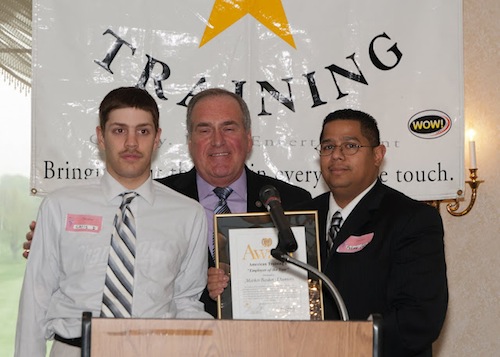


Think your small business is ready to make life matter for a person with a disability? There are lots of tools online to help you find out. (Photo courtesy of Paige Connors, American Training, Inc.)
Small businesses are the backbone of the U.S. economy. Some variation of that sentence will be uttered approximately 14,926 times between now and Election Day in November. Keeping the entrepreneurial engine operating efficiently means keeping costs under control and maximizing the return on investment from every employee hired.
Awareness that both of these goals can still be accomplished while making life matter for an individual with a disability is a continuing process. Fortunately, the media outlets that entrepreneurs tend to pay attention to are taking up the case.
Forbes has been publishing the Diary of a Start-Up blog by Judy Owens since September, 2011. Owens’ company, Opportunity Works, Inc., provides individuals with disabilities temp jobs that can also evolve into permanent job placements in companies in and around St. Petersburg, FL. Her candor about the fear and uncertainty of making the move to go on her own no doubt appeals to the entrepreneurial audience following her story. Likewise, it probably appeals to the clients she’s trying to serve and gives credibility to the suggestions she makes to help business owners understand that hiring a person with a disability does not have to be a cost burden.
In her May 1 post, for example, Owens explains the Federal Medicaid Waiver program for people with disabilities. This program is a benefit to both her and her clients by filling gaps in services that would otherwise prove too costly for them to provide. She writes:
The waiver dollars can pay for programs that Medicaid won’t traditionally cover, like residential rehabilitation, transportation, meaningful day activities (otherwise known as sheltered workshops), therapy services or job support services.
Owens also goes on to discuss other avenues for support should the Medicaid Waiver wait list be too long in Florida. But for small businesses in other parts of the country, an organization called Health & Disability Advocates has developed an online tool that helps businesses locate the kind of support available. FOXBusiness reporter Cindy Vanegas covers its “Think Beyond the Label Campaign” in her May 8 article, “When it’s Time to Hire, Don’t Ignore the Disabled” found in the website’s small business section.
The Think Beyond the Label website provides fact sheets, links to job sites, and success stories about hiring people with disabilities. Vanegas focuses in particular on its Hire Gauge tool, which takes a user through a short series of questions about industry type, location, and size to help an entrepreneur find resources for hiring people with disabilities, which she says are plentiful:
The Hire Gauge determines if a business is eligible for the Federal Work Opportunities Tax Credit, the Disabled Access Credit, the Architectural Barrier Removal Tax Deduction, and any recoupment of recruitment and training costs, if a business owner hires through a vocational rehabilitation program.
With support like that, a business of any size can become a disability-friendly workplace with little to no overhead; becoming instead a more diverse company and one that is helping make life matter for an individual with a disability who is qualified to perform the job.
Comments?
What are the real differences between a small company and a large company hiring people with disabilities? Is it easier in a large or small company? Do the resources need to be written differently for different size companies? We keep reading that small businesses are risk averse – don’t want to take a chance; don’t have the time to take on someone who may need more managerial time; or the forms are too complicated for the tax credits. Would really like to know how to get more people with identified/declared disabilities into small (and large) companies – but given how many hires are made in small business, would like to figure this out!
Hi Mary! I have found my small business customers to be quite open to hiring people with disabilities. It is a burden for many small business to recruit help at all and many owners wrestle with the decisions of doing the work themselves or taking the time to recruit and train. So, when they find a dedicated employee who will stick with them, they are so happy and have few concerns about a disability (maybe with a little education about how a “disability” doesn’t mean an inability to perform).
“The premium experience on Spotify is so much better with this modded APK. Download it now and unlock all features for free.”